Recent News
Profiles & Articles | Press Releases | Media Quotes | Performance Reviews | Recording Reviews
PROFILES & ARTICLES
- Together in Song – WQXR, April 28, 2021
- Meet the People Who Can’t Bring You ‘Messiah’ This Year – The New York Times, December 22, 2020
- WQXR Artist Check In with Kent Tritle – June 9, 2020
- On Becoming a Professional Choral Singer–Advice from the Guru – MusicalAmerica.com, July 13, 2017
- Chorus Call – KENT TRITLE is one of North America’s busiest choral conductors. This month he takes on the challenge of Mahler’s mighty eighth symphony – Opera News, January 2016
- A musical man about New York prepares for his Columbia homecoming – Columbia Daily Tribune, Oct. 11, 2013
- The New Maestro of Morningside Heights – Morningside Heights magazine, Feb. 2013
- A Conductor Finds His Muse in the Pews – The Wall Street Journal, Mar. 25, 2012
- A Choirmaster With Many Masters: Kent Tritle, Sunday Routine – The New York Times, Dec. 2, 2011
- St. John the Divine Taps New Music Director – The Wall Street Journal, Jul. 14, 2011
- The Master of Many Choruses – The Wall Street Journal, May 25, 2011
- Kent Tritle’s Juilliard Portrait – Juilliard Journal, March 2011
- Kent Tritle: One Man, Three Messiahs – NPR – All Things Considered, Dec. 24, 2010
- Ten Questions for Kent Tritle – WQXR, Dec. 10, 2010
- Spirit Lake Native Tritle to Travel from Carnegie Hall to the Sami Center – Dickinson Cty News, Oct. 6, 2010
- Interview with Leonard Lopate on WNYC – Dec. 22, 2009
- Comfort Ye, Nuance Shall Be Exalted – The New York Times, Dec. 22, 2008
PRESS RELEASES
- Kent Tritle’s 2024-25 Season (press release – pdf)
* Musica Sacra: Bach, Pärt, Tavener, and premieres; Carnegie Hall holiday program of Bach, Mozart, and Beethoven; “SurRound II” at St. John the Divine
*Oratorio Society of New York: Carmina Burana, Messiah, world premiere of Paul Moravec/Mark Campbell All Shall Rise
*Cathedral of St. John the Divine: St. Matthew Passion, Beethoven’s Ninth, and the inaugural recital marking the return of the Great Organ
*Featured appearances in Confluence, a new PBS streaming series, and the All-Star Orchestra series’ sixth season - Kent Tritle’s 2024 Spring Season (press release – pdf)
Kent Tritle’s Spring 2024 Season: Choral Riches with Oratorio Society of New York and Musica Sacra in Anniversary Seasons, and the Cathedral Choir of St. John the Divine
- Kent Tritle’s 2023-24 Season (press release – pdf)
*Kent Tritle’s 2023-24 Season Includes the 150th Season of Oratorio Society of New York
*Handel’s Samson and Messiah, Bach’s Magnificat, Mozart’s Requiem, and 150th Season Celebration Concert with Oratorio Society of New York
*Schütz & Handel, Messiah, and “Re:Soundings,” a Surround-Sound ChoralEvent with Musica Sacra
*Saint-Säens “Organ” Symphony with the New York Philharmonic - Kent Tritle’s Spring 2023 Season (press release – pdf)
*Music by women composers spanning five centuries with Musica Sacra
*World premiere of Stabat Mater for soprano and tenor, chorus, organ, and orchestra by David Briggs at the Cathedral of St. John the Divine
*Bach’s Mass in B Minor with Oratorio Society of New York at Carnegie Hall
*Two NYC organ recitals, and performances of Roman Festivals with the New York Philharmonic on the organ at David Geffen Hall
*The Dream of Gerontius in Salt Lake City - KENT TRITLE IS THE 2020 RECIPIENT OF CHORUS AMERICA’S MICHAEL KORN FOUNDERS AWARD FOR DEVELOPMENT OF THE PROFESSIONAL CHORAL ART (press release – pdf)
Chorus America has announced its 2020 awards program honorees, and Kent Tritle is the recipient of the Michael Korn Founders Award for Development of the Professional Choral Art. Named after one of the founders of Chorus America, this award was established in 1978 to honor an individual with a lifetime of significant contributions to the professional choral art.
MEDIA QUOTES
“In New York, the undisputed king of the Messiah is Kent Tritle.”
–New Sounds, New York Public Radio, December 20, 2021
“Kent Tritle, New York’s leading choral conductor…”
~The New Yorker, December 1, 2014
“Choral conducting superstar Kent Tritle…”
~Time Out New York, December 2013
“Kent Tritle…the brightest star in New York’s choral music world…”
~Allan Kozinn, The New York Times, December 17, 2008
“New York City’s foremost choral conductor…”
~Time Out New York, March 26-April 1, 2009
“Kent Tritle, Manhattan’s choral man of the moment…”
~The New Yorker, April 20, 2009
“Tritle…has climbed to the top of the New York choral scene…”
~Leslie Kandell, American Record Guide, Jan/Feb 2010
“The Oratorio Society [of New York]…now led by the rock-star music director Kent Tritle…”
~Jan Benzel, The New York Times, September 2, 2010
“Kent Tritle, New York’s reigning choral conductor…”
~Allan Kozinn, The New York Times, September 12, 2010
“One of America’s most accomplished and beloved choral conductors”
~Anastasia Tsioulcas, NPR Music, July 2012
PERFORMANCE REVIEWS
REVIEW: Musica Sacra “Multitude of Voyces”
Conductor Kent Tritle shaped and coaxed a lush, present sound from the choir with precision and grace. The attention to detail throughout was outstanding, and pitch, dynamics and diction were superb from the beguiling “Alma Redemptoris Mater” by Renaissance nun Isabella Leonarda, which opened the program, to the closer, twentieth-century composer Undine Smith Moore’s slightly jazzy arrangement of the spiritual “We Shall walk through the valley.”
~Joanne Sydney Lessner, Opera News, July 2023 [full text]
REVIEW: Collegium Cincinnati’s intimate ‘Messiah’ a sublime addition to holiday season
Guest conductor Kent Tritle led performances of Handel’s great oratorio [Messiah] ….To say it was revelatory is almost an understatement. …this was a deeply thoughtful, spiritual and ultimately joyous reading through each of the oratorio’s three parts. … Tritle’s exuberant leadership was energized from beginning to the big, final ‘Amen’ chorus.
~Janelle Gelfand, Cincinnati Business Courier, December 9, 2019 [full text]
RANJBARAN: We Are One, MORAVEC: Sanctuary Road | Kent Tritle & Oratorio Society of New York
The Oratorio Society of New York presented two world premieres on May 7 at Carnegie Hall in a concert that resonated with uplift and timeless significance. We Are One, by the Iranian-born composer Behzad Ranjbaran, is an expression of the universal desire for peace, using texts in Spanish, Persian, Hebrew, Arabic, and English. Composer Paul Moravec and librettist Mark Campbell’s Sanctuary Road, whose subtitle describes it as an oratorio based on the writings of William Still, a conductor for the Underground Railroad, combines individual portraits of the journey to freedom into a tapestry of yearning and exultation. … It was difficult not to be stirred by this evening’s powerful message of peace, freedom, and universal humanity. Conductor Kent Tritle showed magnificent command of these challenging new works and his massive musical forces.
~Joshua Rosenblum, Opera News, August 2018 [full text]
Einojuhani Rautavaara’s Vigilia at the Cathedral of St. John the Divine
I have followed and participated in choral singing in New York City for decades, yet was astonished at the vocal capacities of these singers, under Tritle’s dedicated and profoundly musical direction…Truly, this was a choral concert for the ages…For those of us who love choral music, and for those of us who particularly love choral music connected to the Eastern Orthodox tradition, this concert was possibly the finest event of the 2016-17 season.
~Arlo McKinnon, Opera News, January 2017 [full text]
Musica Sacra’s ‘Messiah,’ Buoyant and Burnished at Carnegie Hall
With an excellent chorus and reliably top-notch soloists, the annual performances of Handel’s “Messiah” by Musica Sacra, under the direction of Kent Tritle, command a loyal following.
~Corinna da Fonseca-Wollheim, The New York Times, December 23, 2015 [full text]
Musica Sacra, the notable professional chorus and mainstay of the New York choral scene, has a strong reputation both for its interpretations of the classics, such as the annual performances of Handel’s “Messiah,” and for its commissioning of new works…The program opened with Robert Paterson’s gorgeous “Lux Aeterna,” a setting of excerpts from the Requiem Mass and featured on a new disc of the composer’s choral works. Tautly scored with vivid contrasts and soaring lines, the work proved a highlight of the program.
~Vivien Schweitzer, The New York Times, March 5, 2015 [full text]
It is better in such a case to take an analytic step back and savor the work (Mendelssohn’s “Elijah”) as a whole — its sheer beauty, its exquisite balance of chorus and orchestra, its canny pacing — and its felicitous details. And Mr. Tritle provided plenty of opportunity.
~James R. Oestreich, The New York Times, March 3, 2013 [full text]
Kent Tritle, one of New York’s busiest choral conductors, led the Musica Sacra Chorus and Orchestra in an exemplary rendition of the (Lord Nelson) mass at Alice Tully Hall on Monday evening. The choir sang with beautifully shaped phrasing and dynamics throughout, sounding particularly lovely in the Sanctus.
~Vivien Schweitzer, The New York Times, October 24, 2012 [full text]
In July he announced that he would leave the Church of St. Ignatius Loyola to become the director of cathedral music and organist at the Cathedral Church of St. John the Divine, and after leading his last Sacred Music in a Sacred Space concert in September, he took up his new post. Chief among his tasks is remaking the Cathedral Choir in his image, and on Wednesday evening he offered a look at that work in progress, in the first of two concerts in a revived Great Music in a Great Space series. … The Cathedral Choir on this occasion was a tightknit 17-voice ensemble, accompanied by a continuo group — Raymond Nagem, organist; Arthur Fiacco, cellist; Roger Wagner, bassist — and its strengths were apparent from the first notes of the Bach motet “Jesu, Meine Freude” (BWV 227). Chief among them was solid, thoroughly unified sound in the chorale movements that frame the motet and punctuate its more ornate verses. And in Bach’s more freely contrapuntal writing, Mr. Tritle oversaw a superbly balanced, carefully sculptured performance.
~Allan Kozinn, The New York Times, March 30, 2012 [full text]
Bringing freshness, let alone novelty, to a performance of Handel’s “Messiah” is a challenge. But the Oratorio Society of New York, under its music director, Kent Tritle, certainly did so on Monday night at Carnegie Hall with a vibrant performance of the piece in the seldom-heard arrangement by Mozart…It was a pleasure to hear the Oratorio Society’s splendid performance of Mozart’s beguiling arrangement under Mr. Tritle, in his seventh season as music director.
~Anthony Tommasini, The New York Times, December 21, 2011 [full text]
To anyone who regularly attends choral concerts in New York, Kent Tritle is surely a name to be reckoned with. As the organist and choral director of the Church of St. Ignatius Loyola on Park Avenue from 1989 until this summer, Mr. Tritle nurtured one of the city’s most formidable music programs. Factor in his activities as the music director of Musica Sacra and the Oratorio Society of New York, his regular show on WQXR-FM and his steady roles with the New York Philharmonic, the Juilliard School and the Manhattan School of Music, and Mr. Tritle can seem ubiquitous. In a surprising development in July, Mr. Tritle announced his departure from St. Ignatius Loyola to assume the position of director of cathedral music and organist for the Cathedral Church of St. John the Divine on the Upper West Side. … On Wednesday evening Mr. Tritle inaugurated his new role with a solo recital on the cathedral’s Great Organ….
~Steve Smith, The New York Times, November 25, 2011 [full text]
This was his final performance as director of the superb St. Ignatius choir and orchestra, and it seemed that the 10-minute standing ovation that ended the evening was as much for Mr. Tritle’s work over all as for the score and the richly textured, finely polished, high-energy performance.
~Allan Kozinn, The New York Times, September 15, 2011 [full text]
The Choir and Orchestra of St. Ignatius Loyola, conducted by Kent Tritle, the mastermind of Sacred Music in a Sacred Space, were everywhere excellent. The chorus seized its real opportunity to shine as a whole in the Handel anthem, to glorious effect…
~James R. Oestreich, The New York Times, May 26, 2011 [full text]
Kent Tritle, who is in his sixth season as music director at the Oratorio Society, seemed keenly aware of this work’s pitfalls and deftly avoided them. His pacing was impeccable: the work’s overall shape and the tempo relationships among the recitatives, arias, ensembles and choruses were carefully judged but never fussy. Even such seemingly small considerations as the transitions between movements were considered: a couple of seconds of anticipatory silence between the chorus “Then Did Elijah the Prophet Break Forth” and the tenor aria “Then Shall the Righteous Shine Forth” perfectly captured the shift from public to private devotion. The Oratorio Society is huge — the roster lists 174 vocalists — but Mr. Tritle had it singing with such transparency that even in the densest passages the words came through clearly, as did each strand in Mendelssohn’s rich harmonic fabric.
~Allan Kozinn, The New York Times, April 28, 2011 [full text]
With 32 fine choristers and 26 orchestra players, the forces were just big enough to make a consistent impact in the large hall, if never an overwhelming one. And it was a particular pleasure to hear the interweaving lines and individual words in the choruses and double choruses play off one another with such clarity…
~James R. Oesteich, The New York Times, February 24, 2011 [full text]
The thirty-two-voice chorus produced a polished, even sound across its four/eight parts (many of the choruses are scored for double choir), with tight ensemble and crisp diction…Kent Tritle conducted energetically, with clear, often poetic gestures…(Handel’s Israel in Egypt)
~Derek Greten-Harrison, Opera News, February 23, 2011 [full text]
A welcome New York revival of Handel’s oratorio Jephtha took place at the Church of Ignatius Loyola on October 13, with the church’s own choir and orchestra under their music director, Kent Tritle, plus a sextet of capable soloists….Jephtha shows Handel’s innovative skill at adapting Baroque conventions to a more fluid, conversational style. … Under Tritle’s alert but unstressed pacing, the appropriately small chorus and orchestra executed their work with verve and discretion.
~John W. Freeman, Opera News, January 2011 [full text]
Musica Sacra follows period practice traditions regarding tempos and ornamentation. The orchestra performed beautifully throughout the evening, with transparent textures, a buoyant pulse and expressive phrasing. Its spry and nuanced playing, both soft-spoken and dramatic in turns, was aptly matched by the fleet, cleanly enunciated and radiant singing of the chorus, which performed with immaculate flair…
~Vivian Schweitzer, The New York Times, December 23, 2010 [full text]
With the select 32 members of the Musica Sacra chorus and a chamber orchestra of experienced players, Mr. Tritle conducted an impressively transparent and vibrant “Messiah.” He has worked extensively in the early-music movement. Yet there was no interpretive agenda evident here. The tempos tended to be fleet and the textures clear. But from the first phrases of the orchestral sinfonia that begins the piece, played with crisp but unexaggerated articulation of the dotted-note rhythms, the music-making was beguilingly natural.
~Anthony Tommasini, The New York Times, December 22, 2009 [full text]
Hearing the British composer John Tavener’s Requiem in its United States premiere at the Church of St. Ignatius Loyola on Wednesday night, in the opening concert of the Sacred Music in a Sacred Space series, you felt literally engulfed in pantheistic ecstasy.
~Steve Smith, The New York Times, October 9, 2009 [full text]
Contemporary works were the main business of Kent Tritle’s Sacred Music in a Sacred Space concert on Wednesday evening at the Church of St. Ignatius Loyola. But perhaps as a point of reference — as a way to show how far some sacred choral music has traveled, and how completely other works are linked to the past — Mr. Tritle opened his program with a setting of “Lux Perpetua Lucebit Sanctis Tuis,” by the 16th-century composer Philippe de Monte. …The works could hardly have been more varied, but they flourished consistently in the lush, seamless blend that Mr. Tritle’s 32-voice Choir of St. Ignatius Loyola produced.
~Allan Kozinn, The New York Times, February 12, 2009 [full text]
The Top Ten Classical Events
(From #4 “Bernstein at 90”): One especially reverberant moment came during Chichester Psalms [October 1, 2008, Sacred Music in a Sacred Space concert], which calls for singing the 23rd Psalm in Hebrew. When 11-year-old Andres Felipe Aristizabal intoned the word “Adonai,” it was impossible to disbelieve those green pastures.
~Justin Davidson, New York Magazine, December 7, 2008
The end of Rosh Hashanah brought a pairing of Bernstein’s and Beethoven’s great humanist pleas—Chichester Psalms and the Ninth Symphony—performed in the dazzling nave of St. Ignatius Loyola for the series “Sacred Music in a Sacred Space.” Bernstein would have been pleased at the sympathies between Beethoven’s rock-splitting radicalism and the hard-won simplicity of his own score, between the hortatory German of the “Ode to Joy” and the exuberant Hebrew Psalms. The lusty opening movement got softened a bit by the church’s reverberations, but the payoff was a final timpani blow that an archangel might have struck. Conductor Kent Tritle wrapped the rest of the Psalms in a golden shroud of sound…
~Justin Davidson, New York Magazine, October 5, 2008 [full text]
The playing [of Beethoven’s Symphony No. 9 by the Orchestra of St. Ignatius Loyola] was unified and electrifying … and in the last [movement], the balance between the orchestra, chorus and soloists was just about perfect.
~Allan Kozinn, The New York Times, October 3, 2008 [full text]
If the Department of Justice investigated conducting monopolies, its agents would be taking a close look at Kent Tritle. Just under two decades ago, [Kent Tritle] started the Sacred Music in a Sacred Space series at the Church of St. Ignatius Loyola and quickly turned its resident choir into a finely polished, stylistically nimble ensemble. In 2005 he was appointed music director of the venerable Oratorio Society of New York, and this year he added Musica Sacra to his portfolio. That accounts for a significant quotient of high-profile concert choirs in New York, and in the last week Mr. Tritle led concerts by all three.
~Allan Kozinn, The New York Times, May 22, 2008 [full text]
The performance [by the Oratorio Society of New York of Brahms’s “Tragic” Overture] was an animated one…clean and crisply enunciated. [In Brahms’s German Requiem]…the effect was magical, the musicianship superb. …[What was] memorable was the good effort of these dedicated musicians, amateurs in the best and noblest sense of the word.
~Fred Kirshnit, The New York Sun, May 22, 2008 [full text]
Mr. Tritle, his superb chamber choir and an orchestra of mostly modern instruments gave a viscerally thrilling performance [of Monteverdi’s Vespro Della Beata Vergine with the Choir and Orchestra of St. Ignatius Loyola]. …The soul of the performance was in the malleability of Mr. Tritle’s tempos and dynamics. …When Mr. Tritle and his choir were at their best – in their bright-edged rendering of the “Dixit Dominus” and their warm-hued “Ave Maris Stella,” for example – they tapped into the sublime joy of the work more thoroughly than any ensemble I’ve heard perform these Vespers in a long while.
~Allan Kozinn, The New York Times, May 16, 2008 [full text]
Magicians are generally ill advised to reveal their tricks, but when the conductor Kent Tritle let the audience in on a few crafty secrets during a concert [including Schnittke’s Concerto for Choir] by the Choir of St. Ignatius Loyola on Wednesday night, the tactic paid off. As it happened, understanding how Schnittke’s effects were created did not undercut a sense of awe inspired by the intense emotions they conjured…the singers did themselves proud, delivering a deeply heartfelt account with polished tone and excellent diction.
~Steve Smith, The New York Times, February 15, 2008 [full text]
RECORDING REVIEWS
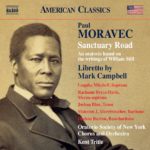 Paul Moravec – Sanctuary Road
Paul Moravec – Sanctuary Road
“Harriet Tubman may be the best-known conductor of the Underground Railroad, but a new album highlights another key figure: William Still, who helped nearly 800 enslaved African Americans escape to freedom in the years before the Civil War. It’s about time Still was more widely recognized for his efforts as an abolitionist, historian and conductor for the Underground Railroad. He’s … the central figure of Sanctuary Road, a new oratorio by Pulitzer Prize-winning composer Paul Moravec based on Still’s 1872 book The Underground Railroad. Kent Tritle deftly leads the Oratorio Society of New York Orchestra, Chorus and a dynamic cast of African American soloists.”
~Tom Huizenga, NPR Music, January 2020
“The relevance of Sanctuary Road (2017) in our present century cannot be overstated…Moravec sets the text, drawn from Still’s writings by librettist Mark Campbell, with commendable clarity in an attractive score that attains true grandeur of spirit as it proceeds, especially in its extended finale (depicting Still’s recovery of his records after the war). Much credit for this goes to conductor Kent Tritle and the Oratorio Society of New York, who commissioned the work; their haunting premiere performance, at Carnegie Hall in 2018 with a finely balanced quintet of soloists, forms the basis of this marvellous recording.”
~Guy Rickards, Gramophone, May 2020
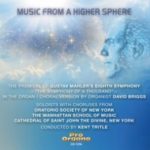 Music from a Higher Sphere – Mahler’s Symphony No. 8, David Briggs’s organ-choral version
Music from a Higher Sphere – Mahler’s Symphony No. 8, David Briggs’s organ-choral version
“The result [of this organ-choral transcription] here permits the listener to hear this mammoth masterpiece in a new way, with alternative colors produced by the Great Organ as well as the opulent acoustic of the Cathedral of St. John the Divine, NYC…. …the overall effect is stunning…. Kudos to David Briggs, Kent Tritle, all of the vocalists here featured, and the gifted recording technicians at Pro Organo for the vision, labor, commitment, and love that produced this remarkable and unique performance of one of the world’s great musical treasures.”
~The American Organist, April 2017
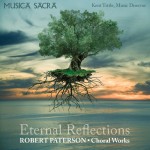 Musica Sacra – Eternal Reflections: Choral Music of Robert Paterson
Musica Sacra – Eternal Reflections: Choral Music of Robert Paterson
“As shaped by Music Director Kent Tritle, the myriad hues, lyricism and nobility in Paterson’s music emerge in all their splendour. The choristers of Musica Sacra lift their lines from the page, bringing passionate and lucid life to the varied challenges.”
~Donald Rosenberg, Gramophone, July 2015
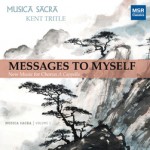 Messages to Myself: New Music for Chorus A Cappella
Messages to Myself: New Music for Chorus A Cappella
Musica Sacra/ Kent Tritle – MSR Classics
The choir, as usual, is incandescent. I can’t think of an American ensemble that is any better at balance, variation in tone coloring, warmth, or technical acumen than this bunch…This country should be proud to sport such an ensemble, and conductor Kent Tritle has obviously not let standards wane one little bit.
~Audiophile Audition, May 22, 2014
This is a fascinating survey of a cappella music written by living composers over the past 25 years … there’s not a single work in this mixed sacred-secular program that lacks a high level of musical craftsmanship, imaginative treatment of texts, or strong listener appeal. … This is a sweetly sonorous and technically refined chamber ensemble of just under 30 voices, and Tritle has surely drawn some of New York’s finest vocalists to its ranks.
~American Record Guide, May/June 2013
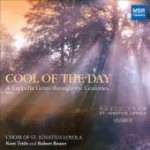 Cool of the Day, A Cappella Gems through the Centuries
Cool of the Day, A Cappella Gems through the Centuries
Choir of St. Ignatius Loyola
Beautiful disciplined voices, clear diction, precise intonation, homogeneous ensemble, an arching legato line, and solid rhythmic direction—are met in full, with the happy result of a monumental work [Strauss’s German Motet] stunningly performed, captured and preserved on disc. … I know of no other recording that matches the depth and beauty of these performances.
~Fanfare, May/June 2012
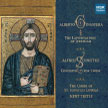 Ginastera’s The Lamentations of Jeremiah and Schnittke’s Concerto for Choir with the Choir of St. Ignatius Loyola
Ginastera’s The Lamentations of Jeremiah and Schnittke’s Concerto for Choir with the Choir of St. Ignatius Loyola
The Choir of St. Ignatius Loyola sings with an almost desperate affection in both of these works, while director Kent Tritle (also now taking over the reins of Musica Sacra) maintains a firm grip on the overall pace to wonderful effect. Highest recommendation.
~Steven Ritter, Audiophile Audition, April 14, 2009
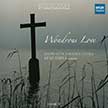 Wondrous Love
Wondrous Love
The 18 voices of the St Ignatius Loyola choir make up the core of one of the nation’s finest church choirs. Its members are all solo-grade professionals who are active in New York City’s rich opera, oratorio, and period performance scenes. Their singing offers an especially full-throated approach to vocal production, on top of tremendous expressive and dynamic range. Their program is a stunning traversal of mostly ancient and modern music. One of the album’s chief glories is a rich and ringing account of JS Bach’s motet, Komm, Jesu, Komm. This choir’s rich, vibrato-heavy sound doesn’t carry over into all their work. The Renaissance pieces-delivered in crystal-clear straight tone demonstrate their remarkable vocal discipline and finesse. This is one of the albums I’d pull out in a flash to prove to fussy skeptics that America has church choirs that needn’t take a back seat to the best European ones.
~American Record Guide, September/October 2006
All this music is extremely well served by what is evidently an expert choir that has been splendidly trained. The choir makes an excellent sound, and their tuning,balance and diction are all first rate. …Suffice to say that they turn in as good a performance as I’ve heard.
~MusicWeb-International.com
The versatility of conductor and singers is evident in their seemingly effortless traversal of such varied musical material.
~Choral Journal, October 2006
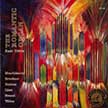 The Romantic Organ
The Romantic Organ
What a major artist Kent Tritle is! Surely he’s our next Virgil Fox and/or E. Power Biggs; he combines the classical approach of the latter with the romantic massiveness of the former. …You’ll not hear better recordings of this kind of music on any label I’m aware of; and Tritle’s performance of Liszt’s “Prelude and Fugue on the name of B.A.C.H.” is the single finest rendition I’ve ever heard.
~Patrick Meanor, Listener Magazine, Winter 1997
